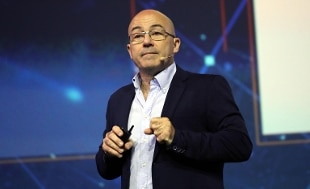Historic ruling: France condemned for failing to act against climate change
Legambiente: smog outlawed in 35 Italian cities despite the lockdown
Environment, von der Leyen: "We need a global and revolutionary understanding"
Ecomafie, crimes against the environment are increasing: but also complaints
The climate has already changed: here are the ten-year impacts of climate change on our urban centers
Sassoli: Europe wants to be a leader in the fight against climate change
Share
03 March 2021 "Between
July and August
we have exhausted our share of natural resources and we are living 'in debt' on next year's resources". This was stated by Roberto Cingolani, Minister of Ecological Transition, speaking at 'Towards the National Conference for Sustainable Development. Together for the future, a sustainable relaunch for Italy '.
"We are used to living in the era of economic debt - he said - but now we are facing a
frightening environmental debt
". "In the last 10 years we have had 8 of the hottest years since the measurements are made - said the minister - If we exceed the carbon dioxide budget, we would have an irreversible increase in temperature".
"We can commit but the
budget is total
, it belongs to everyone, and if someone on the other side of the planet does not collaborate, we have few levers ", says Roberto Cingolani, Minister of Ecological Transition.
So" humanity must agree "on the fact" that it is in interest of all "fight the climate emergency," and then we must do our part as a nation, as a state "." On the pollution front ", says Cingolani," we have the great
challenge of transport
, a great challenge on electrification, admitted and not granted that it is the only solution, a great challenge on public transport and the use of private vehicles. "
We have no more time.
The consequences of the climate emergency in progress are regulated by thermodynamics, so what affects the climate it is "
fast damage
with a long recovery", because "even if we stop emitting CO2 today, the system takes ages to cool down". So "we don't have much time, we are enough at the end of the game." So when we think about the consequences of emergency a climatic "we are not talking about 500 years" from today but of the fact "that
at the end of the century
the problem of high water will affect coastal cities", warns Cingolani, and "our children will be present" and will suffer. And it is about "those who are already there, not three or four generations from now, I find this aspect very disturbing", specifies the minister.
Producing in a sustainable way
The Minister of Ecological Transition, speaking in live streaming at 'Towards the National Conference for Sustainable Development. Together for the Future, a Sustainable Revival for Italy ', he explains that more generally, the challenge is "on systems that allow for a
strong industry
, which produces GDP, but which is as
sustainable as
possible", while. "the correlation between the health of the planet, people's health and a just society is the real reason for the ecological transition, but there is no recipe and no one has it".
"We have to understand what to do", says Roberto Cingolani. "The solution is not to stop progress but not even to say that in the name of progress anything can be done" because in the ecological transition "different issues must be considered, which change over time", for example, "now that we leave Covid there these are
different
issues from those we might have in a time of great economic prosperity ". In short, "there is no sustainability that is always good, we have to understand each time what to do", says the minister, applying "an
adaptive model
".
There is no digital at no cost
"Digitization is a fantastic technology to be sustainable, if used intelligently" but "there is no solution at no cost, digital has a cost". From this point of view, "the consumer model of changing devices often does not go in the right direction", this is for mobile phones, for example, but "if you extend the theme to servers" and to the rest of the equipment "the problem is enormous". Therefore, children should be "taught
digital sobriety
measures
" to reduce waste.
In fact, digital technology, in addition to the energy necessary to produce plastic, build the various parts and for all the various production steps, requires "about thirty rare earths, complex and noble materials that are only needed for a mobile phone", and which then end up in the garbage, due to inadequacies in the waste cycle, reports Cingolani. This happens because "there is a lack of large
end-of-life
recycling programs for
the electronic component", notes the minister, and "the issue also concerns batteries, with a huge problem of recovering precious materials". All this must remind us that "digital is not free" in terms of emissions, explains Cingolani, "
digital weighs
".

